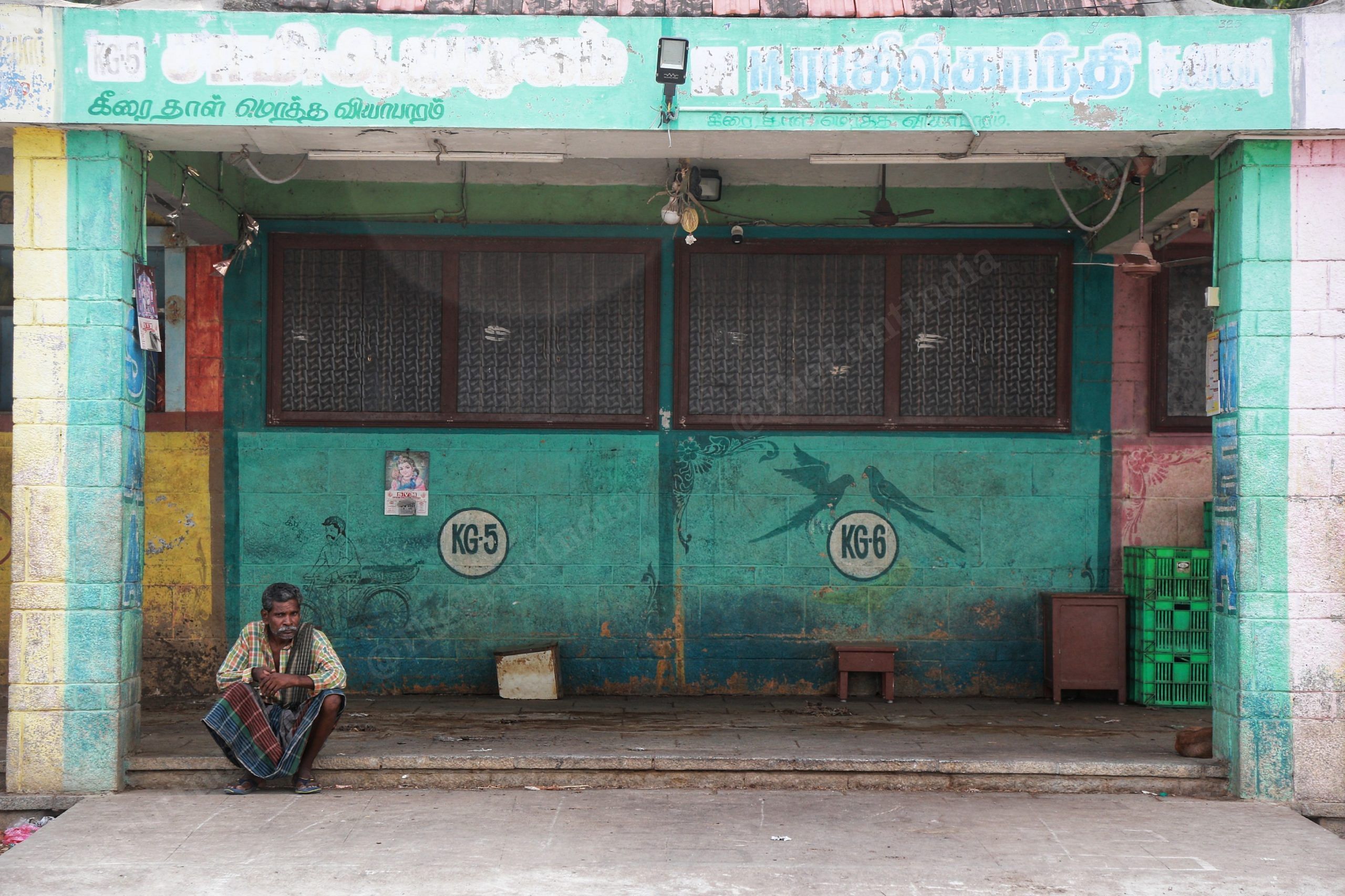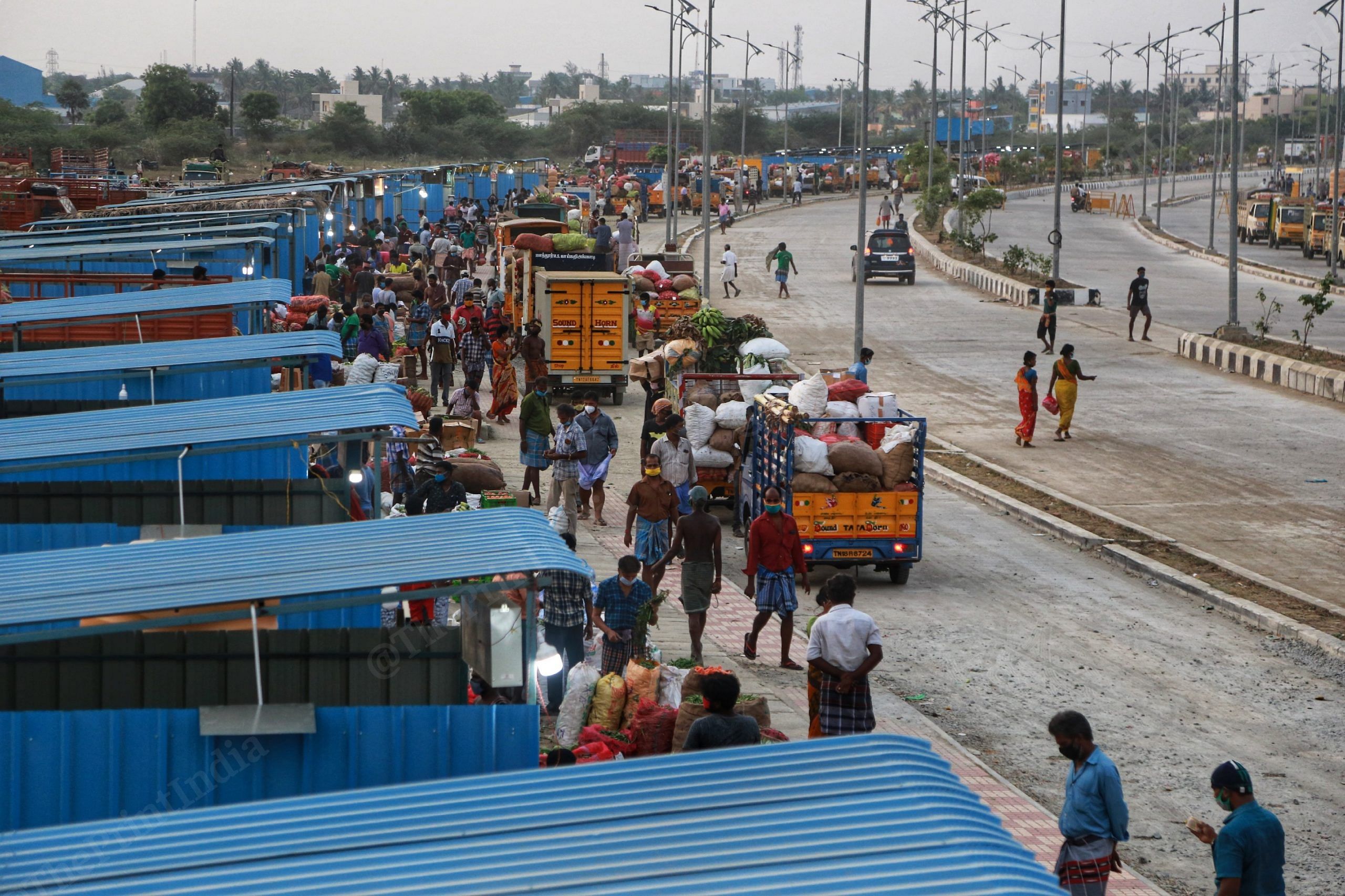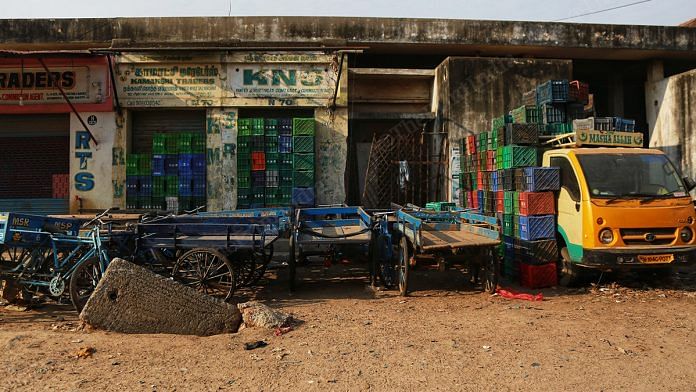Chennai: Balraj, 36, is among the handful of men who still come to the 65-acre Koyambedu market in the heart of Chennai. The men, all of them loaders and daily wagers, are surrounded by sealed outlets and abandoned rickshaws at what is Asia’s one of the largest wholesale markets for fruit, vegetables and flowers.
Established in 1996, Koyambedu has 3,750 licenced shops but the market has been shut since 5 May after it emerged as one of the largest Covid-19 clusters in the country, with over 2,000 cases being traced back to the market. Such has been the spread that Koyambedu has been blamed for the exponential rise of cases in the nearby districts of Ariyalur, Perambalur, Cuddalore, Villupuram, Chengalpet, Tiruvallur and even parts of neighbouring Andhra Pradesh.
With the market shut, the few daily wagers and loaders are the only ones of the over 10,000 labourers who worked here still milling about the premises. The men live in the market, which they say has been home for nearly 20 years, but now with no work. They have little to eat and even fewer basic necessities like soap to wash themselves.
They survive on food from the Amma Canteens, run by the state government across the metropolitan city.
The Chennai administration has set up a makeshift market at Thirumazhisai in the outskirts of Chennai, and about 18 km from the Koyambedu market. That, Balraj says, has left small-time loaders like him with no means to get there, especially because two- and three-wheelers are not allowed at Thirumazhisai. The administration has also banned the entry of retailers at the new market.
Balraj is stuck at Koyambedu as there are no buses to his Tirupattur village in Vellore district, about 200 km from Chennai. “We are not able to go back to our hometown and there is no food. We are starving,” he told ThePrint. “Whether people die of coronavirus or not, they will definitely die of hunger.”
He went on to say that it was okay if he didn’t have a job but just wanted food. “The minute it is possible, all of us will go home,” Balraj said.

The Federation of All Associations of KWMC Periyar Market, which represents the traders at Koyambedu, has now written to the state government asking for the market to be reopened but the administration is yet to act on it.
“We are asking for Koyambedu to open because all the farmer produce has been going to waste,” said D. Rajasekaran, the federation’s president. “Around 500-1,000 tonnes of vegetables are thrown away every day as there is no place to store them in Thirumazhisai, since it is an open market. We cannot even store the produce for a single day.”
He added that the market can be reopened with stringent implementation of Covid-19 regulations. “When the market was functioning in Koyambedu during the lockdown, there was no security or police presence to ensure social distancing,” Rajasekaran said. “And now there are elaborate checks, sanitisation and many police personnel at Thirumazhisai. If the same takes place in Koyambedu now, the situation can be managed.”
There is a consensus in the market that the state government’s decisions may have caused the spike in cases at Koyambedu. The market catered to an average footfall of 1 lakh people a day before the Covid-19 crisis and continued to see a steady flow of customers and sellers even during the lockdown.
The rush further intensified a day before the Tamil New Year on 13 April but stakeholders in the market claim the damage was done on 24 April when the state government announced a lockdown within a lockdown, which led to immense rush in the market as people resorted to panic-buying.
Sellers at the market said thrice the usual crowd descended on 24 April, and the market emerged as a huge Covid-19 cluster a few days later.
Also read: More testing, new containment & quarantine strategies — how Tamil Nadu is tackling Covid spurt
Buyers and sellers unhappy at Thirumazhisai
At the Thirumazhisai market, gaining entry is an elaborate process.
All vehicles are meticulously disinfected at the very first barrier, while two-wheelers and three-wheelers are not allowed. At the next check post 200 metres away, identity cards are checked and body temperature measured.
A health control room has been set up at the entrance to the market. Unlike Koyambedu, Thirumazhisai is an open area and allows for greater social distancing measures.

But a number of factors here have left both wholesalers as well as buyers unhappy.
Ramu and Muthukumar, two wholesale vegetable buyers, reached the market around 3 am Saturday. They were among the first to reach, and had made it all the way from Pallikarnai in South Chennai — a 30-km drive away.
Speaking to the ThePrint, the two said they don’t like the Thirumazhisai market, and listed a number of difficulties that they have been facing since the closure of Koyambedu.
For starters, they said, the distance not only takes more time but also adds to their fuel costs. They also pointed out that the new market does not allow retail buyers.
“We cannot buy vegetables in retail and they end up getting wasted,” Muthukumar said. “Earlier in Koyambedu, we would take four to five retail shop owners and go in a vehicle and share diesel and petrol expenses. Since they are not allowed in the market, our expenses and costs have risen sharply. The distance is simply too much.”
A major grouse of both the sellers and the buyers in the new market is that vegetables have to be thrown away every day — the buyers because they have no option but to buy large quantities of vegetables as retailers are banned, and the sellers due to a lack of storage facilities.
Annudurai, who had travelled all the way from Marai Malai Nagar, said he preferred Koyambedu “any day”. He had come to buy onion, carrot, brinjal, potato and beans. He added that while the prices of the vegetables were reasonable, the fact that he had to buy such large quantities left him with a lot of unsold vegetables.
Sellers at Thirumazhisai were equally unhappy. Ram Kumar, a wholesaler who was selling onions, told ThePrint that compared to Koyambedu, Thirumazhisai did not have adequate facilities to hold vegetables for a longer time. “There is also no facility for toilets, it is very difficult,” he added.
Sellers and buyers reach the market any time between 2:30 an and 3 am and leave only by 11 am.
Another seller at the market, Babu Aiyappa, complained that many of his vegetables were being stolen. “There is no safety here. If it rains, I lose Rs 1 lakh worth of vegetables. There are new buyers here and new thieves as well.”
Talking about what happened in Koyambedu days before it was shut and sealed, Aiyappa said the government announced that it would lock the market in three days, due to which the crowd tripled on 24 April. “There were more than 1 lakh people. The procedure was correct but they should have been given more time,” he said.
Also read: Retired Army man, grandmas, students — everyone on the special trains has a lockdown story




Lesson for Govt any unplanned activity can supported limieted population density . take away improve layout or start new market . For evolving species new market is better choice